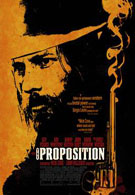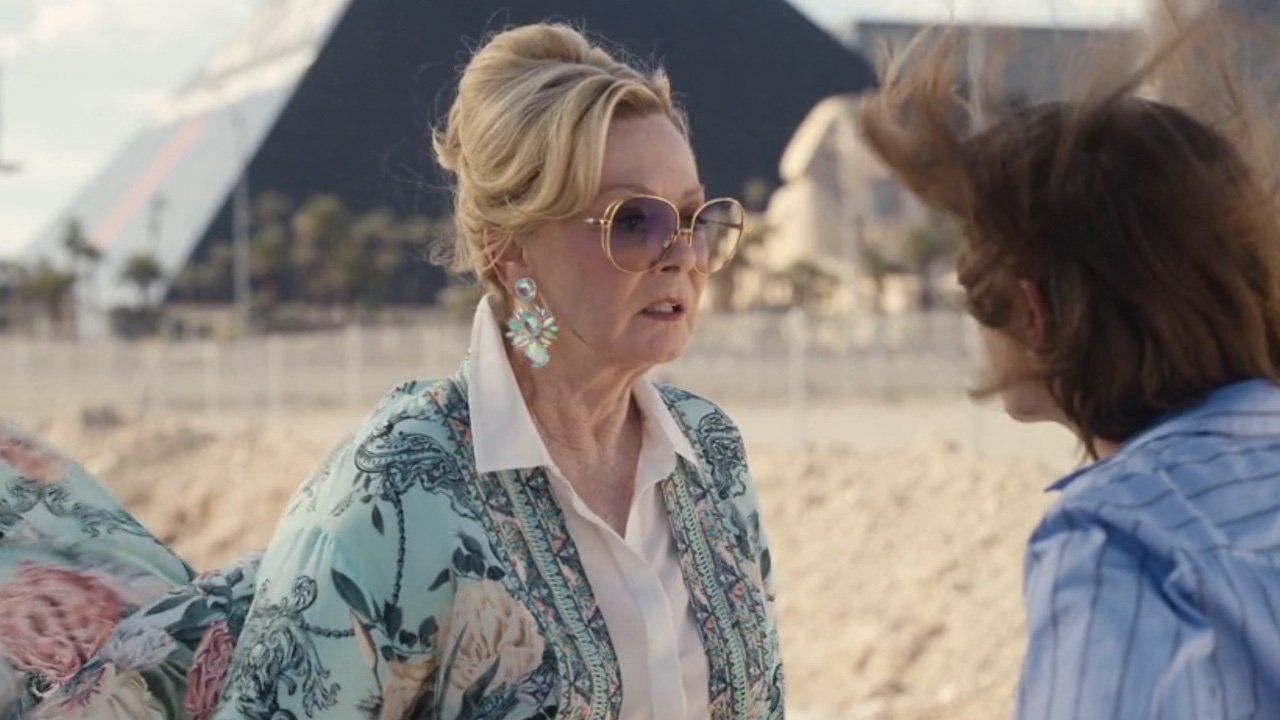The Proposition, directed by John Hillcoat and written by Australian musician/composer Nick Cave, is due for release in May. The film has ambitions as sweeping as the majestic panoramas of the Australian Outback where it was filmed. The story takes place around 1880, as the era of the highway robbers known as bushrangers was waning. The most prominent of these criminals, who were often romanticized as Robin Hood types or Irish Catholic political activists, was the murderous Ned Kelly, who may well have provided the inspiration for the film. Three of the main characters are bad-guy brothers: robbers, rapists, and murderers, the youngest only fourteen. A problem: with no back story, except for cryptic references to a terrible crime recently committed by the trio, we are expected to be interested in these creeps and what happens to them.
The "proposition" of the film's title is made by Captain Stanley (Roy Winstone), the local police chief. The three Burns brothers have killed a family of three, raping the pregnant mother in the process. During a subsequent gun battle with police, brother Charlie (Guy Pierce) and his fourteen year-old sibling, Mike (Richard Wilson) are captured. Captain Stanley makes Charlie an offer. If he finds and kills brother Arthur (the craziest and most bloodthirsty of the trio, and the gang's suspected mastermind), his life will be spared, as well as that of young Mike, who is scheduled to hang on Christmas Day.
With the Outback as setting, the film has an immediate plus going for it. The scenery is so spectacularly beautiful that it inspires poetic thoughts even in these murderous scum. Everything is on a monumental scale: the mountains, the sunsets, a huge moon suspended in a vast, open sky. But there's another side. Heat, dust, and flies, millions of flies, going into people's eyes, noses, ears and mouths. The broad themes here are man against the environment, white man against aborigine, slovenly, drunken cops against even more slovenly and drunken robbers. Cruelty and mayhem abound.
Captain Stanley's wife, English, proper, and somewhat naive, does her best to make an English home complete with antique furniture and a piano in the middle of this sandy, gritty, fly-infested hole. The sight of her parading in her Sunday best amid the squalor, carrying a parasol, reminds me of the Noel Coward line about mad dogs, and, in this case, Englishwomen, going out in the midday sun. Captain Stanley, whom she calls by that very name, sweats, drinks, worries, and plots. He's under constant pressure from the local landowner to corral the bushrangers and control the aborigines. An elderly bounty hunter with an agenda of his own and plenty of tricks left up his snot-encrusted sleeve is magnificently played by John Hurt, and the acting performances as a whole are sterling.
After a while, the filth, the flies, and the violence, in the absence of an engaging story, simply turned me off. The narrative unfolds ever so slowly, the script is talky and overstuffed with literary and philosophical digressions. Things got to the point that I found myself hoping that yet another character would get his head blown off, if only to break the monotony. Even the climax, for all its unimaginable violence, left me cold. I felt as if I had been hijacked to the Outback, my nose rubbed in the blood-red dirt, my face kamikaze'd by flies, my mind stupefied by interminable literary quotes from smelly drunks and homicidal ne'er-do-wells.
The filmmakers appear to have presumed a knowledge of Australian frontier history that I did not have, knowledge that might have enhanced my appreciation of the film, at least on an intellectual level. The soundtrack includes tone-deaf songs that were probably intended to lend a rough authenticity to the story. I just wanted to cover my ears between the caterwauling and the incessant buzzing of those aggressive flying critters.
It's clear to me that a lot of thought and care went into the making of The Proposition. Unfortunately, the film doesn't quite work as drama, since the conflict is between people whose horrific behavior is not explained or tempered by any knowledge of their personalities or backgrounds. If you're going to sell me on the concept of honor among thieves and cold-blooded murderers, you're going to have to do a lot better than this. The film that Cave and Hillcoat conceived is highly personal, and, in lacking universality, fails as a work of cinematic art. And did I mention the flies?











